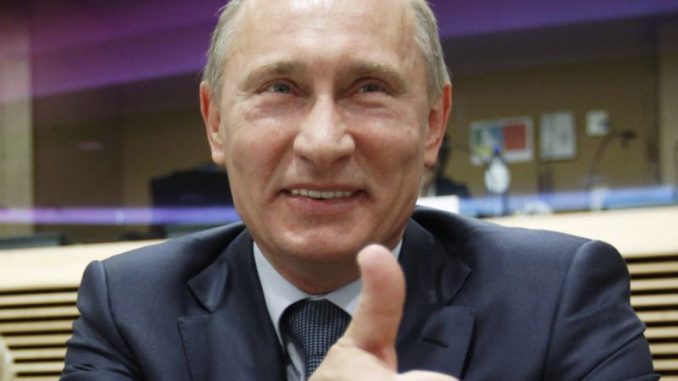
The ruling United Russia party is projected to win the Russian parliamentary elections, securing Vladimir Putin’s role as leader of The Motherland.
Putin can now get on with the task that people around the world want him to do and destroy the New World Order as promised.

BYPASS THE CENSORS
Sign up to get unfiltered news delivered straight to your inbox.
You can unsubscribe any time. By subscribing you agree to our Terms of Use
Latest Video
Rt.com reports:
With almost half of the votes counted, early results suggest that the ruling United Russia party heads the polls, followed by right-wing party LDPR with 14.3 percent and the Russian Communist Party with 14.2 percent. Fair Russia comes fourth with 6.2 percent, the Russian Central Elections Committee said.
A further 10 parties that took part in the elections did not receive enough votes to make it into parliament, although some of their candidate could still enter parliament as a result of constituency races.
Meanwhile, according to exit polls conducted by state pollster VСIOM, LDPR came second with 15.3 percent while Russia’s Communist Party and Fair Russia obtained 14.9 and 8.1 percent respectively, the poll showed.
According to another exit poll by Public Opinion Foundation, United Russia, led by Prime Minister Dmitry Medvedev, obtained 48.7 percent of the votes, followed by Russia’s Communist Party, which gained 16.3 percent.
The nationalist party LDPR also garnered 14.2 percent. Fair Russia came fourth and is the last party to enter the parliament post-election, as it obtained 7.6 percent of the vote while other parties did not clear the 5 percent threshold, the poll showed.
Russian President Vladimir Putin and Prime Minister Dmitry Medvedev arrived at the United Russia party campaign office, where the PM, who is also the chairman of Russia’s ruling party, delivered a speech to party members and thanked Putin, who is the party founder, for demonstrating support for United Russia by visiting the campaign office.
Medvedev also called the election results “a victory” for the party.
Russian people support political stability, Vladimir Putin said as he visited the United Russia campaign office. “The situation is not easy and people see it – and they want the political system and society to remain stable,” the president said, as quoted by TASS.
“Ordinary people know that empty promises are worth nothing,” he added, commenting on preliminary election results and stressing that United Russia will continue its work aimed at Russia’s development.
The total voter turnout stood at 39.37 percent two hours before the polling stations closed, Russia’s Central Elections Committee said in a press release. At the same time, Moscow and St. Petersburg were among the Russian regions with the lowest turnout, which amounted to almost 20 percent in the Russian capital and 16.12 percent in St. Petersburg.
Sunday’s voter turnout is “not the highest” in comparison to that of previous elections, but it is still “high”, Vladimir Putin said, commenting at the end of the voting.
On Sunday, Russians elected the officials to the State Duma, the lower house of parliament, as well as to dozens of municipal and regional bodies on the first nationwide Single Election Day – previously voting was held in December.
It is also the first time that the mixed principle has been used in elections to the State Duma since 2003, as in 2007 and 2011 Russians elected MPs from federal party lists only.
One international observer at the Russian State Duma elections, Javier Hurtado Mira, the president of centre-right political organization, the Democrat Youth Community of Europe, told RT Spanish that the atmosphere at his polling station was “calm.”
“People are casting their votes just like in other European countries,” he said adding that the voting process is “absolutely transparent” and “Russian democracy has evolved.”
This time, half of the parliament’s seats will be occupied by deputies included in the federal candidate lists of parties that will clear the 5 percent threshold. The other half will be taken up by candidates elected according to a first-past-the-post system in each of the 225 independent constituencies or districts that together form the Russian Federation.
Fourteen political parties took part in State Duma elections.
In Russia, each person over the age of 18 is eligible to vote, except for prisoners and legally incapable persons. The total number of Russian voters amounts to 111.6 million with about two million of them living abroad. Voter turnout in Russia’s previous parliamentary elections in 2011 amounted to 60.2 percent.


